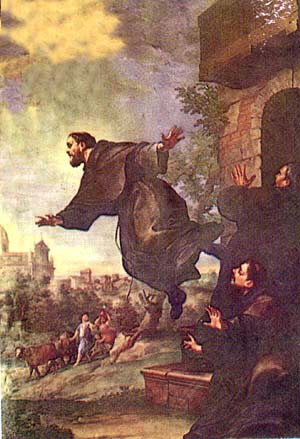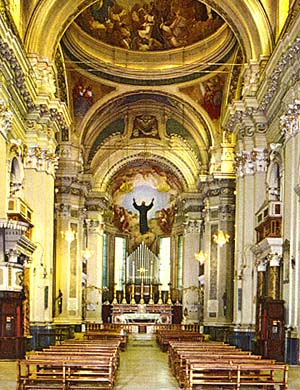Biographical selection:

St. Joseph of Cupertino in prayer, he was called "the Flying Friar" because of his frequent levitations |
St. Joseph of Cupertino (1603-1668) was an Italian mystic whose life is a wonderful combination of a complete lack of natural capacity and an extraordinary supernatural efficiency. He lacked every natural gift. He was incapable of passing a test, maintaining a conversation, taking care of a house, or even touching a dish without breaking it. He was called Brother Ass by his companions in the monastery.
He was born on June 17, 1603 into a family of poor artisans. Because of his father's debts, he was born in a shed behind the house, which was in the hands of bailiffs. He was sickly and often at death's door during his childhood, and at age seven he developed a gangrenous ulcer which was later cured by a religious man. He was always despised by his companions who called him a fool. Even his mother wearied of him and repudiated him for his lack of any human value.
Later, when he entered the religious life, he faced worse difficulties. The Capuchins received him as a lay brother but his ineptitude and abstraction made him unbearable for the other religious. Often he was taken in ecstasy and, oblivious of what he was doing, he would drop the food or break the dishes and trays. As a penance, bits of broken plates were fastened to his habit as a humiliation and reminder not to do the same again. But he could not change. He could not even be trusted with serving the bread because he would forget the difference between the white and brown breads.
Finally, considering that he was good for nothing, the religious took his habit and expelled him from the monastery. Later, he declared that having the habit taken from him was the greatest suffering of his life and that it was as if his skin had been torn from his body.
When he left the monastery he had lost part of his lay clothes. He was without a hat, boots, or stockings, and his coat was moth-eaten and worn. He presented such a sorry sight that when he passed a stable down the lane, dogs rushed out on him and tore his apparel to worse tatters. He escaped and continued along the road, but soon came upon some shepherds, who thought he was a miscreant and were about to give him a beating, when one of their number had pity on him and persuaded them to let him go free.
He went to the house of his uncle, who, ashamed of him, scolded him and sent him back into the streets with nothing. Reaching his native town, he came to the house of his parents, where his own mother berated him.
Finally, the superior of the Monastery of Grottela discerned his sanctity and decided to take him in as a servant. He was appointed to the stable, and made the keeper of the monastery's donkey.
It was there that the sanctity of St. Joseph of Cupertino began to be recognized. He was always humble, willing to serve, and of good cheer. The Superior decided to admit him to the monastery with hopes that he might learn enough to be ordained, but the effort seemed hopeless. Joseph could not comment on any passage of Scriptures except one: "Beatus venter qui Te portavit" [Blessed be the womb that bore Thee].
When the time came for his examination for the diaconate, the Bishop opened the Gospels at random and his eyes fell on that one text Joseph knew well. Joseph was able to expound on it with success. A year later came the tests for the priesthood. All the postulants except Joseph were very well prepared. The Bishop called on a number of the candidates, who responded superbly. Supposing that all were at the same intellectual level, the Bishop approved all of them without questioning the rest. Joseph was among the candidates who were asked nothing. Therefore, on March 4, 1628, Joseph became a priest at 25 years of age despite his limitations and the opinion of men.

The Basilica of St. Joseph of Cupertino in Osimo, Italy, which houses the Saint's body.
A picture of the Saint levitating is painted close to the ceiling, where his body often rose |
During this period of his life, the spiritual consolations he had enjoyed since his childhood abandoned him. Later he wrote to a friend about that difficult time: "I complained a lot to God about God. I had left everything for Him, and He, instead of consoling me, delivered me to mortal anguish."
He continued: "One day, when I was weeping and wailing in my cell, a religious knocked on my door. I did not answer, but he entered my room and said: 'Friar Joseph, how are you?'
"'I am here to serve you,' I answered.
"'I thought you did not have a habit,' he continued.
"'Yes, I have one, but it is falling apart,' I responded.
"Then, the unknown religious gave me a habit, and when I put it on, all my despair disappeared immediately. No one ever knew who that religious was."
From this time on, the life of St. Joseph of Cupertino changed. He became famous for his ecstasies, miracles, and for the gift of levitation, reported by numerous eye-witnesses. He experienced this so often he became known as "the flying Friar." He began to attract so many pilgrims to the monastery that his superiors had to transfer him from one monastery to another to avoid the commotion. Finally, he arrived in Osimo in 1657, where he continued to experience supernatural manifestations of God’s favors daily until he died on September 18, 1663 at age 60 |